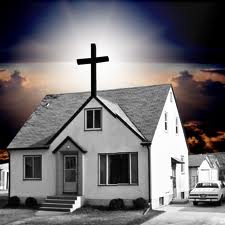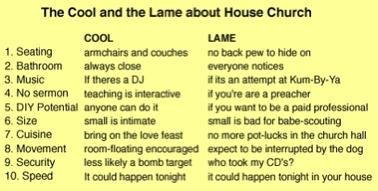 I am not against “House churches.” I love house churches, and I love house church people.
I am not against “House churches.” I love house churches, and I love house church people.
But I do get nervous when house church proponents (HCP) start to condemn all other forms of church. It sounds ominously familiar…
To see what I mean, listen in as I discuss house with with a house church proponent:
HCP: The Book of Acts describes house churches. So house churches are the only biblical way of doing church.
Me: But this is 2013. Things have changed. Don’t you think Jesus might want His church to have changed too?
HCP: No! God wrote down in the Bible the way God wanted church done. Any other way is unbiblical and is doing whatever is right in your own eyes.
Me: But even you don’t do church exactly like they did it in Acts. You’ve made some modifications for our time and culture. So doesn’t this mean that you are unbiblical?
HCP: No. The changes we made are still consistent with what the Spirit was doing in Acts. We have maintained the pattern found in the Bible.
Me: Who gets to decide which changes are allowable and which ones are not?
HCP: We studied the Scripture, prayed, sought the leading of the Spirit, and made these adjustments.
Me: Yes, but other believers have done the same thing, and made a few adjustments that you did not make, and now you are condemning them for their changes. Why do you want to say that your way is the one right way, and theirs is wrong?
HCP: They adopted their ways from pagan practices, like buildings, priests, choirs, sermons, and salaries.
Me: So anything that pagans do is wrong for churches to do also?
HCP: Yes, that’s right.
Me: Well, you know there are lots of pagan religions around the world and throughout time that look remarkably similar to a house church. They meet in homes, teach each other the ideas of their faith, share some food, and do what they can to encourage each other to follow their religion. Often they pray to their gods and sing some songs too.
HCP: What religions are those?
Me: Almost all religious groups, to tell you the truth. They only move into temples and other buildings once they reach a certain size. But some groups try to remain in homes, such as Bahai, Santeria, Voodoo, and many forms of Buddhism and Hinduism.
HCP: Well, just because these groups are similar to House Churches doesn’t mean that House Churches are following their practices.
Me: I agree. And the same argument applies to churches with buildings, pastors, choirs, sermons, and salaries.
HCP: I don’t know about that.
Me: Even if history shows (which is does) that the church borrowed these things from pagan cults, history also shows that the early church borrowed their practices from Jewish and Greco-Roman patterns. The early believers didn’t just invent this house church pattern out of thin air. The followed some of the cultural patterns that were around them at the time.
Furthermore, just because something used to be “pagan” does not make it wrong. You and I used to be pagan, but God has washed us, redeemed us, and raised us up in Christ to live in a new way. If God can do this for people, why can’t He do it for customs and cultural patterns also?
—–
The conversation continues like this for quite some time. As we debate, I keep thinking I’ve heard all these arguments before.
Then it dawns on me.
The arguments are not identical, but the whole “This is the right way to do church and everybody else is wrong” idea is taken right out of the mega church model handbook: “This is the right way to do things, and if you want to reach our culture for Christ, you must follow this pattern. Otherwise, God can’t use you.”
As it turns out, house churches and mega churches have something in common after all…
I am not trying to criticize house churches (or mega churches). Instead, I am hoping that all of us who seek to follow Jesus, can simply follow Him in the way that helps us live out the Gospel in our lives to the fullest extent possible, and extend grace to those who follow Jesus differently. People who attend a mega church can bless people who attend a house church, and vise versa. And people who don’t attend any church at all, but simply try to follow Jesus relationally, can bless both groups as well and be blessed in return.
And if you want some more arguments for and against the house church, here is funny chart I found: Enjoy!





We’ve checked out both, and each have their pros and cons. I really cringe when I hear the line “doing what is right in your own eyes”, which I have never heard in any context other than “I’m right and you’re wrong”. If I had to choose between house church and mega church I’d probably go with the former since I don’t want to help pay for the mega properties, staff and programs that go with the latter.
Yes, I don’t want to give the impression that everyone can just do what they want. But at the same time, I do think that God allows incredible flexibility and creativity in how we live as part of His family.
I have had a gathering in my house for over 7 years. I was an elder for over 15 years in a large Assembly of God church and was steeped in the institutional church. I left after learning of and studying the NT model. I use to be dogmatic about doing “church” according to the bible but I have softened. There is a biblical model and I believe it is still valid but on the other hand, there is no prohibition against meeting in buildings built for that purpose. I do however still reject any ruling authority of a hierarchical clergy. That is anit-biblical being in direct opposition to the words of Jesus, Paul and Peter. I do believe that the biblical model is there for a very good reason. One may be that people can’t enter into loving, familial relationships inside a big building looking at the back of peoples heads. That happens when they get together in smaller groups and share their lives together. In that sense small is better, but being in large communities also has its benefits. History is what it is and the institutional church has been the vehicle that God has used, for better or worse, in spreading the gospel. God has used what mankind has given Him because he does not dwell in any building, house or temple,He lives in His people no matter where they are.
I hear what you are saying about a ruling authority. But even still, many house churches have these as well… sometimes they are called “prophets” or “apostles.” Other times, they are just the one who people look to for all the answers on biblical and theological issues.
I do think there is a place in both types of churches to use their spiritual gifts, of course, but how it works out so as not to create a ruling authority is very difficult.
It is all a big giant mess. The problem, I believe is in the fundamental belief that God ‘wrote’ the Bible. Therefore any verse can be taken out of context or someone can pick and choose certain parts and cry out, “Thus saith the LORD!”. The Letter of the Word(The Bible) has become the ‘Abomination’ that makes (the Church) desolate because ‘the letter’ has replaced the Spirit. People refuse to hear what the Spirit of God is saying in 2013 and cling to the letters, testimonies, accounts and stories from 2000-3500 years ago which are things that were cultural significant to those times, and instead reject the Spirit of the Word of God for today.
That is why most churches are blind and stumbling in spiritual Babylon. They are stuck on the letter and as Scripture even says, “the letter kills, the Spirit gives life.”
“You show that you are a letter from Christ, the result of our ministry, written not with ink but with the Spirit of the living God, not on tablets of stone but on tablets of human hearts.” 2 Cor. 3:3
We are supposed to BE the “Scripture” or “Word of God” but here we are 2000 years later trying to decipher ancient tablets. Spiritually speaking the Church is still in the stone age, hence all the ‘pockets’ of communities that cannot see eye to eye.
Yes, it is all a big mess. I don’t know what the answer is. I think some of it might be the willingness to tell people, “This is how I am living, because it helps me show love to others, and live as Jesus lived, but I am not going to judge or condemn you for attending a mega church (or house church) if that is what best helps you follow Jesus and love others.”
I have come to the conclusion that most believers continue to miss the boat regarding what we have grown to understand regarding the “church.”
The arguments and confusion seem to be mainly over how a group of believers chooses to assemble and govern themselves.
It seems the most popular way is to “join” a church – or create one.
Churches come into existence when enough people decide to create a 501c3, buy a building, hire a pastor and administrative employees, and meet weekly to hear the paid pastor preach and take up a collection that is mostly used to pay salaries and maintain real estate. All with a goal to grow the congregation with more donor-members and build more and/or bigger buildings, hire more pastors and administration – which, as we all know, is the true measure of success for churches here in America.
In a nutshell,this model of what we have all come to know as “church,” provides believers with something they strongly feel they need: 1) A place to “go” to church 2) A place to “have” church 3) Simply a place they can “call” church.
Believers need to get past the notion that church is some “place” you go or something you “do.”
I think it’s mainly an identity problem more than anything else. I admit, I find it much easier to go somewhere and do something than to actually “be” something.
Being something demands that I must put forth a lot of effort and even take responsibility for whatever I choose to be. And with respect to our calling in Christ, this is to “be” done 24/7, with all the responsibility on ME.
So as far as I’m concerned, the corporate church does more harm to the “body” than good. It acts as a substitute for what we have been called to “be” in Christ. It enables believers to vanquish in their laziness and puts responsibility at the foot of the corporate entity. That and the fact that’s it’s mostly not biblical in structure with respect to paid pastors, state control, and very poor stewardship of peoples’ hard earned money.
Nothing wrong with assembling regularly as a local body, just keep it simple and don’t think it needs to be anything other than that. Have your assemblies, then go home and be the church! Be Christ! Galatians 2:20
Amen! Well said…
I agree with Ward. This was well stated and is right on target! Thanks for posting this, Neil.